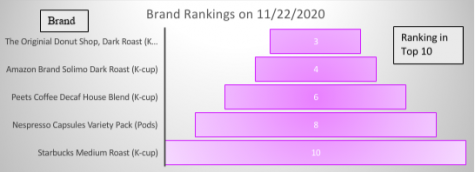Caffeinated comfort: pandemic responsible for rise in at home coffee consumption
Photo by KAL VISUALS on Unsplash
Since the pandemic’s initial impact, Starbucks has seen their revenues decline. In June Starbucks announced a loss of $3.2 billion in revenue in their fiscal third quarter. They attribute this loss in sales to the coronavirus pandemic.
December 9, 2020
Since the pandemic started, professor, Christina Fisanick, has increased her coffee intake from two cups a day to six or more cups.
“I guess because I am home and close to the coffee pot, but also because I feel like I need the comfort of a warm cup of joe in my hands,” said Fisanick, who teaches English at the California University of Pennsylvania. “I associate coffee with good things: friendship, family, relaxing.”
The steaming, aromatic drink brewed up for over 50% of adult Americans, according to E-Imports, and is getting a little more demand than usual these days. Students and faculty at Cal U say that they have increased their consumption of coffee since the pandemic first started, whether to get through hectic days of remote learning or just for comfort.
Before the pandemic, Fisanick enjoyed her daily dose of coffee from both her home and from local coffee shops in Wheeling, West Virginia, where she lives.
“Half of my coffee was purchased at a coffee shop, and half made at home,” she said. “I am blessed with many coffee shops in my area.”
When the pandemic halted many business’ abilities to provide for their customers, Cal U coffee drinkers began to enjoy their daily brew from the comforters of their own home.
“I might have went to Dunkin’ Donuts twice during the pandemic,” said Rodney Taylor, daily coffee drinker and professor of English at Cal U. “I never liked lines or waiting in the drive through during the best of days, so I suppose the pandemic incentivizes me to just brew a cup or two at home.”
For Cal U education major, Gianna Sinatra, the pandemic initially hindered her ability to get her usual cup of coffee from her local coffee shops. Under normal circumstances, she enjoyed a single cup of coffee at home and additional cups from coffee shops throughout her day.
“My family had to be really careful due to my dad being in remission for cancer, so it was really important for all of us to still enjoy life while still following the rules set in place to protect one another,” said Sinatra. “For a while it did change due to everything being shut down but once everything did open back up it was a lot easier to buy coffee from coffee shops.”
Derek Kirk, senior in English at Cal U, said he also had to change his habit of purchasing coffee at stores to making his favorite brew at home.
“Back before the pandemic, I exclusively bought my coffee from coffee shops and other stores because I did not own a coffee maker of any kind,” said Kirk. “However, now that I have access to a coffee machine at home, I usually do not buy it unless I am out and pass by a Dunkin’.”
Sales of home-brewed coffee have topped Amazon’s bestseller lists.
During the week of Nov. 18 through Dec. 2, K-cups and Nespresso pods ranked daily in Amazon’s top ten for their best sellers for grocery and gourmet food.

On Nov, 22, five of the top 10 sellers were coffee with The Original Donut Shop’s dark roast K-cup ranking highest at number three. The Original Donut Shop also ranked in Amazon’s top 10 every day in that week.
On March 22, international coffee shop franchise, Starbucks, released a statement that they made the decision to serve primarily through drive-thru and delivery only in the U.S. and Canada, according to Jennifer Warnick, spokesperson for Starbucks.
Since the pandemic’s initial impact, Starbucks has seen their revenues decline. In June, Starbucks announced a loss of $3.2 billion in revenue in their fiscal third quarter. They attribute this loss in sales to the coronavirus pandemic.
Senior at Cal U, Ryan Machorro-Robinson, has also seen an increase in the amount of coffee he drinks.
“Since the pandemic started, I was back at home and no longer living in Brownsville,” said Machorro-Robinson. “I would and still do drink two to three in the morning but looking back I drank a lot of coffee at night working on assignments, so I’d say my intake has gone up a decent bit.”
While several at Cal U are reaching for more doses of their caffeinated beverage, professors of nutrition at Cal U warn against drinking too much of the voluptuous drink.
“Based on the research for most people 400 mg or less a day is recommended,” said Ben Reuter, professor of the exercise science and sport studies at Cal U. “This is the equivalent of four small cups of coffee. Consumer be aware though; many coffee places brew a higher caffeine level of coffee.”
Reuter said that if you’re unsure about the levels of caffeine in your cup of joe, drink one to two cups.
“Too much coffee may increase heartrate, cause ‘jitters’, decrease the ability to concentrate,” said Reuter. “Based on the research it does not appear to have a diuretic, dehydrating effect, provided consumption is less than 400 mg a day.”
Although there are some down sides to drinking too much coffee, professor in Cal U’s nutrition department, Brian Oddi, said there are some benefits as well.
“Controversies regarding caffeine’s benefits and risks still exist, but reliable evidence is becoming available supporting its health promoting potential when moderate amounts are consumed,” said Oddi. “The most well-known acute effects of caffeine consumption are stimulation of brain function and improvement in mood, and physical performance.”
Reuter said that how you drink your coffee can also affect how beneficial it is for your body. Reuter said that drinking your coffee black is best.
“The trend when adding things, milk, sugar, etc., is to overload and add a lot of additional calories,” said Reuter. “Plain coffee is a low-calorie drink, but adding sugar, milk and various other things that coffee shops sell in coffee drinks can quickly turn into a high calorie drink. Remember there are different roasts of coffee and someone may find they prefer a lighter or a darker roast. It is definitely an acquired taste.”
Reuter said that coffee should be treated like anything else you consume.
“As with anything else moderation is the key and consult with your physician if you are taking prescription drugs to ensure there are not any unintended side effects,” said Reuter.







